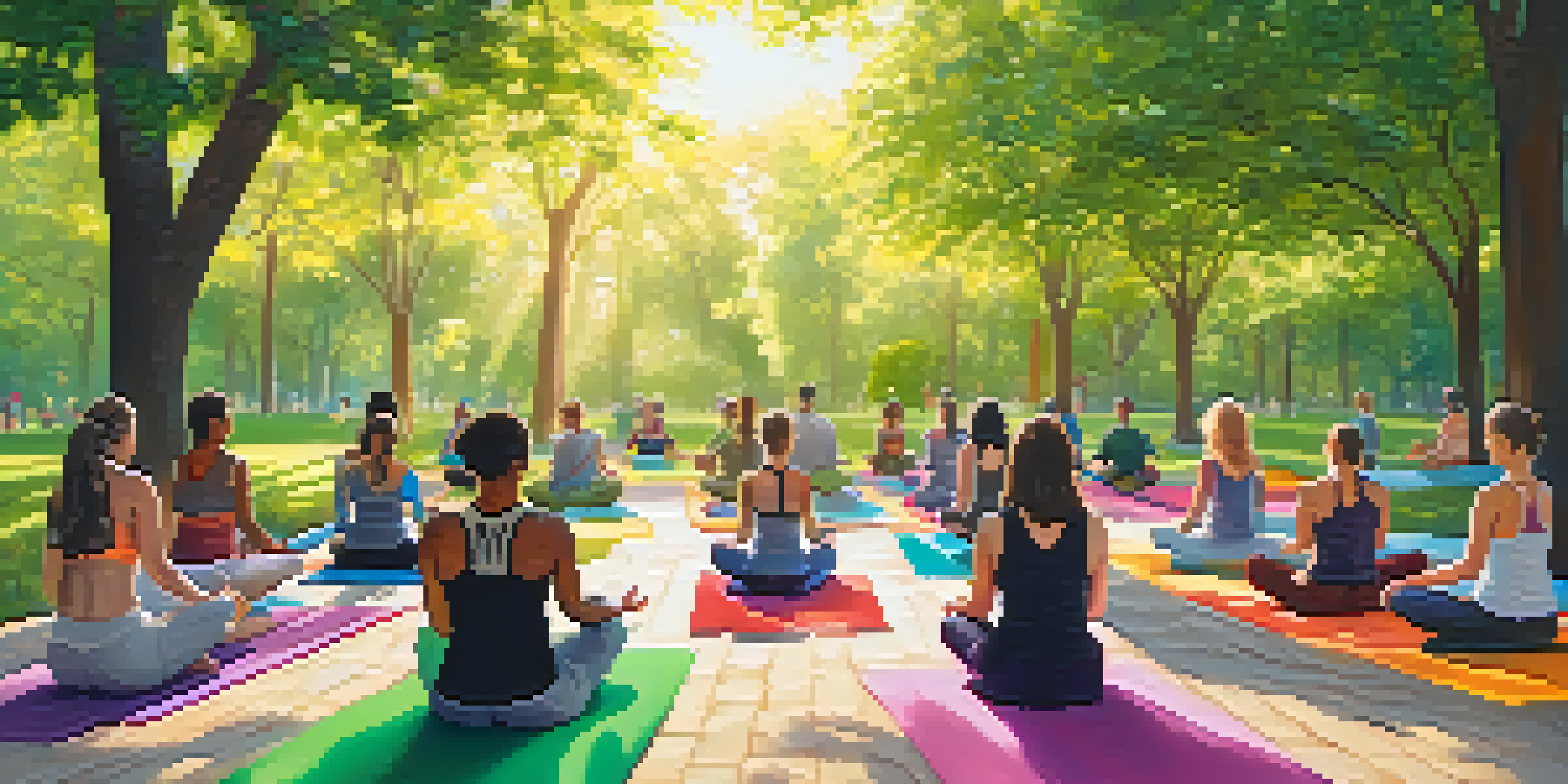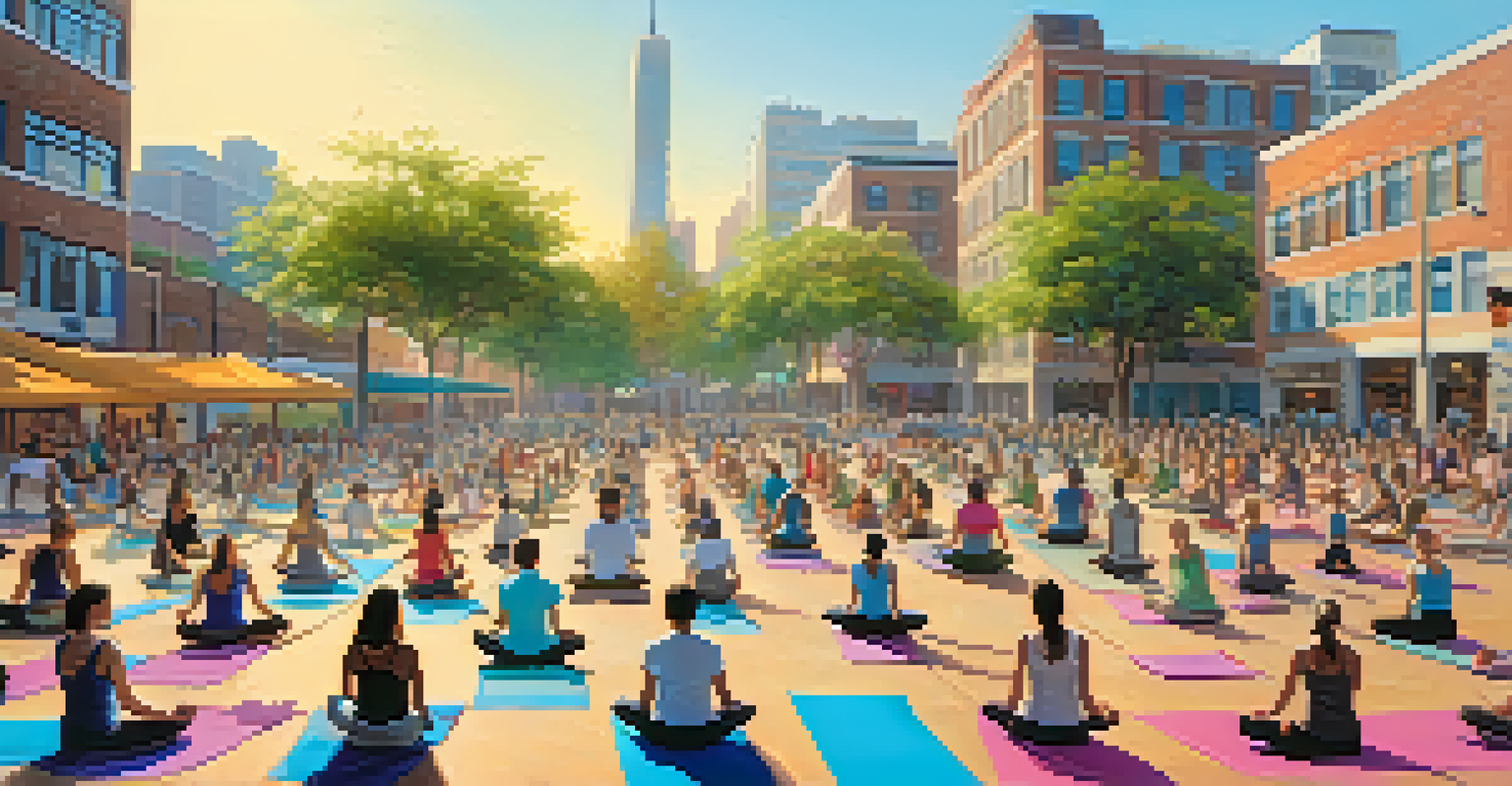Yoga and Activism: Finding Balance in Chaotic Times

Understanding the Intersection of Yoga and Activism
Yoga is often seen as a path to inner peace, but it also has deep roots in activism. Many yogis believe that personal transformation can lead to social change, making the practice a powerful tool for activism. When we cultivate mindfulness on the mat, we become more aware of the world around us and our role in it.
The yoga of action is the path of selfless service, the path of the activist.
The philosophy of yoga teaches us to look beyond ourselves, fostering compassion and empathy for others. This can inspire individuals to take action against injustices, whether it’s advocating for environmental issues or social equality. By merging these two practices, we can create a holistic approach to making a difference.
As we navigate chaotic times, the balance achieved through yoga can help us channel our energy into constructive activism. It reminds us that fighting for change doesn’t have to come at the expense of our mental or emotional well-being. Instead, it can be a harmonious blend of action and reflection.
The Role of Mindfulness in Activism
Mindfulness, a core principle of yoga, encourages us to stay present and aware. In the context of activism, this means being conscious of our motivations and actions as we advocate for change. It allows us to approach challenges with clarity rather than being overwhelmed by emotions or chaos.

By practicing mindfulness, activists can reduce stress and maintain focus on their goals. This practice helps cultivate resilience, enabling individuals to persist in their efforts despite setbacks. When we center ourselves, we can respond thoughtfully instead of reacting impulsively, which is crucial in heated situations.
Yoga Fuels Activism and Change
Yoga not only promotes personal well-being but also encourages social responsibility and activism through mindfulness and community engagement.
Moreover, mindfulness fosters a sense of community among activists. When we share our experiences and support each other, we create a stronger collective voice. This unity is vital for sustaining long-term movements, as it helps individuals feel connected and motivated.
Breathwork: A Tool for Activists
Breathwork, a common practice in yoga, plays a significant role in regulating our emotions. Activists often face stress and burnout, making it essential to find ways to recharge. Deep, conscious breathing can help ground us, allowing for clearer thinking and more effective action.
In the practice of yoga, we learn that the mind and body are interconnected. When we find balance within ourselves, we can create balance in the world.
When we take a moment to focus on our breath, we create space for reflection. This pause can be transformative, helping us assess our feelings and the impact of our actions. In moments of tension, a few deep breaths can shift our perspective and restore our sense of purpose.
Incorporating breathwork into activist routines can also promote physical well-being. Activism can be physically demanding, and proper breathing techniques can enhance our stamina and focus. This practice not only supports our mental health but also empowers our physical capabilities in the fight for change.
Yoga as a Form of Protest
Yoga has been used as a peaceful form of protest in various movements around the globe. Events like yoga in the park or community classes during rallies illustrate how the practice can unite people for a cause. These gatherings promote not just physical wellbeing, but also a shared commitment to societal change.
Such forms of activism emphasize non-violence and inclusivity, making yoga an ideal medium for change. They send a powerful message that people can stand together in support of justice while promoting peace and unity. It shows that activism can be both assertive and gentle, a duality that resonates with many.
Mindfulness Enhances Activist Focus
Practicing mindfulness helps activists stay present and resilient, allowing them to approach challenges with clarity and reduce stress.
Furthermore, these yoga events often attract diverse groups. This variety fosters dialogue and understanding among participants, breaking down barriers and creating a sense of belonging. Ultimately, yoga as protest can inspire participants to engage in broader discussions about societal issues.
Creating a Sustainable Activist Lifestyle
Sustaining an activist lifestyle can be challenging, especially during turbulent times. Yoga encourages us to prioritize self-care, reminding us that we cannot pour from an empty cup. By integrating yoga into our lives, we can maintain our physical and mental health, ensuring we’re equipped to continue the fight.
Establishing a routine that incorporates yoga, meditation, and activism can lead to a more balanced life. This lifestyle allows us to recharge while staying committed to our causes. It’s about finding that sweet spot where personal well-being and social responsibility coexist harmoniously.
Moreover, sharing this balanced approach with others can inspire them to adopt similar practices. When we model a sustainable lifestyle, we not only take care of ourselves but also encourage our communities to engage in self-care. Together, we can build a movement that prioritizes mental health alongside activism.
The Impact of Community in Yoga and Activism
Community is at the heart of both yoga and activism. Participating in group classes or activism initiatives fosters a sense of belonging and support. This connection can enhance our practice and amplify our voices in the pursuit of justice.
In yoga, sharing experiences with others can deepen our understanding and commitment to the practice. Similarly, in activism, collective efforts are often more powerful than individual actions. When we come together, we create a formidable force for change, pooling our resources and ideas.
Community Strengthens Activism
A strong sense of community in both yoga and activism fosters support and collective power, enhancing the effectiveness of their efforts for change.
Moreover, community can provide the encouragement needed to persist in our efforts. Knowing that we’re not alone in our struggles can motivate us to keep going, even when the road gets tough. Together, we can celebrate victories, big and small, fueling our passion for the causes we care about.
Finding Personal Balance Amidst Global Challenges
In the face of global challenges, finding personal balance is crucial. Yoga teaches us that we have the power to center ourselves, even amidst chaos. This practice encourages us to cultivate inner peace, which can then extend outward into our activism.
By prioritizing our mental and emotional health, we can approach activism with a clearer mindset. This balanced perspective allows us to tackle issues strategically rather than reactively. It’s about recognizing our limits and knowing when to step back to recharge.

Ultimately, the journey of balancing yoga and activism is a personal one. Each individual has their own unique path, and it’s essential to honor that. By blending these practices, we can create a sustainable approach to advocating for change while nurturing ourselves.